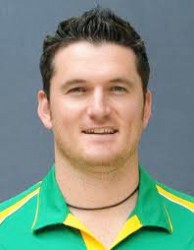CAPE TOWN, (Reuters) – He was seen as a brash, arrogant and aloof South African but no one can dispute the impact Graeme Smith had on the world stage as he became the most successful captain in test history.
Smith’s decision to retire from international cricket just nine weeks after Jacques Kallis quit will usher in a new era for South African cricket, which now finds itself shorn of experience and potentially in a leadership crisis.
The 33-year-old’s runs at the top of the order will be missed but so too will his strength of character and grit in times of adversity.
He has, in many ways, been the face of South African cricket over the last decade and played a key role in taking the side to the number one position in the test rankings.

Thrust into the captaincy role at the age of 22 following the resignation of Shaun Pollock after South Africa’s miserable first round exit at the 2003 World Cup on home soil, Smith admitted it took him four or five years to settle into the job.
While many South African cricket fans have struggled to warm to him, few would argue that he deserves a place among the game’s greats as he has won a record 53 tests as captain, many of those thanks to his own prowess with the bat.
Never the most elegant to watch, he bludgeoned his way to 27 test centuries, five of them double-hundreds, the last of which came less than five months ago against Pakistan in Dubai.
It has been his ability to grind out fourth innings runs, something that will likely be needed again in his final, ongoing, test in Cape Town, that has made him so well respected in the international game.
He led his side to two series wins in Australia and a triumph in England in 2012 that took the team to the summit of world cricket.
Despite facing the possibility of a series defeat to Australia in his final test match, he leaves the side at the very top of the game.
Smith had spoken in the build-up to the third test of still having the passion and desire for international cricket, of wanting to achieve more with this team.
A fifth batting failure in as many innings in the series may have led to him re-evaluating his future plans – the stark reality for South Africa is that they are now not just looking for a new opening batsman who can average close to 50 in test cricket but also a new leader.
There have only been a handful of regular captains of the national side since readmission to international cricket in 1991 – Kepler Wessels, Hansie Cronje, Pollock and Smith.
Choosing the right man to be number five on that list will be crucial.
One-day skipper AB de Villiers has been groomed for the test role and is likely take on the job but it is a big task for a player who at times has been the mainstay of the batting and also acts as wicketkeeper.
But in truth there are no other solid candidates.








